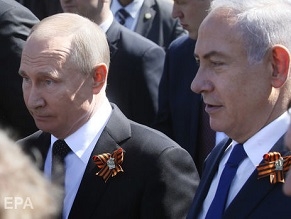|
World Jewish News

Netanyahu hoped that Russian imperialistic symbols could help him. Vladimir Putin & Benjamin Netanyahu, Mocsow, May 9, 2018.
|
Russia sends Syria improved S-300 to counter Israeli strikes
22.10.2018, Israel and the World Russia has reportedly transferred to the Syrian military a more advanced version of its S-300 air defense system in a bid to help Damascus counter Israeli airstrikes against Iranian and Iran-backed forces in the country.
The Russian daily Izvestia reported Friday that the upgraded system, the S-300PM-2, boasts more advanced radar and communications systems. It has been in use by the Russian army since 2010.
Three batteries of the system have been transferred to Syria, the report said, citing a Defense Ministry official in Moscow.
If the report is correct, it’s likely to mark the first time Russia has handed the more advanced version of the S-300 to a foreign army.
The new systems come in addition to the less advanced S-300 batteries delivered by Moscow earlier this month.
Israel has carried out hundreds of strikes in Syria against what it says are Iranian and Hezbollah targets, but there have been no reports of suspected Israeli airstrikes since Syria accidentally downed a Russian plane during a recent Israeli raid in the country, an incident that raised tensions between Jerusalem and Moscow.
Fifteen Russians were killed in the September 17 incident, which Moscow blamed on Israel, accusing its pilots of using the larger Russian plane as cover.
Israel disputes the Russian findings and says its jets were back in Israeli airspace when the plane was downed.
In response, Moscow announced new measures to protect its military in Syria, including equipping Damascus with the S-300 system.
On October 9, Prime Minister Benjamin Netanyahu said he told Russia’s vice premier during talks in Jerusalem that Israel must continue to hit hostile targets in Syria, despite Moscow’s delivery of the system.
Netanyahu said at a press conference that he told Maxim Akimov that Israel would continue to fight what it says are Iranian attempts to entrench itself militarily in Syria and channel advanced weaponry to its Lebanese ally, the Hezbollah terror group.
Despite the delivery of the S-300 air defense systems to the Syrian military, Israel was committed as a matter of self-defense to continue its “legitimate activity in Syria against Iran and its proxies, which state their intention to destroy us,” Netanyahu said.
The meeting was the first public sit-down between a senior Russian official and Netanyahu since the incident.
Russia and Israel set up a hotline in 2015 to avoid accidental clashes in Syria, but the new measures have led to concern among Israelis that their strikes will now be limited there.
Netanyahu, who met Akimov on the sidelines of meetings of a bilateral economics committee, said he believed that the current dispute with Moscow would be resolved.
“I think that with common sense and goodwill we can come to a solution that will allow the continuation of the good coordination between the Russian and Israeli militaries,” he said.
Netanyahu said earlier this month that he would meet Russian President Vladimir Putin soon to discuss coordination.
The leaders have spoken at least three times by phone since the September incident.
Both Iran and Hezbollah — enemies of Israel — support Russian ally Bashar Assad’s regime in his country’s civil war.
By TOI STAFF
AFP contributed to this report.
The Times of Israel
|
|
